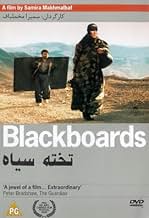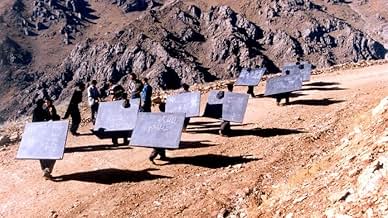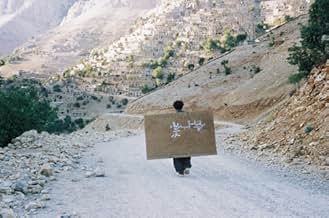IMDb RATING
6.8/10
3K
YOUR RATING
Kurdish teachers Said and Reeboir roam Iranian villages near Iraqi border during war. Said guides displaced men, marries widow Halaleh. Reeboir joins child smugglers. Amid danger, they try t... Read allKurdish teachers Said and Reeboir roam Iranian villages near Iraqi border during war. Said guides displaced men, marries widow Halaleh. Reeboir joins child smugglers. Amid danger, they try teaching nomadic students while soldiers patrol.Kurdish teachers Said and Reeboir roam Iranian villages near Iraqi border during war. Said guides displaced men, marries widow Halaleh. Reeboir joins child smugglers. Amid danger, they try teaching nomadic students while soldiers patrol.
- Director
- Writers
- Stars
- Awards
- 3 wins & 3 nominations total
- Director
- Writers
- All cast & crew
- Production, box office & more at IMDbPro
Featured reviews
This film is flawed in any number of ways - stories are unresolved; scenes of military oppression are unconvincing; and more generally I was left with a somewhat unmoved feeling when the lights came up. I thought "The apple" was a fantastic film in its challenging combination of documentary and fiction, but perhaps that an over-simplicity in "Blackboard"'s storyline was exposed by the same honest, basic direction and storytelling that made Ms Makhmalbaf's previous film really powerful.
There are definitely many positive aspects to this film as well. It fearlessly deals with one group of people (nomads who I think are Kurdish) people who really are vulnerable and at the mercy of powerful and highly suspect governments on both sides of the border. It shows that these people have a cultural strength that seems to transcend their harsh circumstances. In its other story strand it shows movingly how children, even more vulnerable, are exploited by a deregulated commercial system. Beetle-browed, bowed beneath heavy loads in the hot sun, self-defensively referring to themselves as 'mules', the kids are old before their time.
The film also has a (more or less) powerful sense of transcendental storytelling to it. The nomads are all oppressed people, looking for a promised land. The children are mythical also: the kid's story about the rabbit has an air of antiquity about it.
Neither group of oppressed people has time for the education that the main characters offer. They are too busy surviving. The use of non-actors in the film is a strength and a weakness. In a story that is more obviously fictional than "the Apple", some performances are a little wooden. But I think the emotional punch of realism, the feeling that we may in effect be watching something that is happening today somewhere in the world, more than makes up for this formal, actorly problem.
Hurriedly, then: a flawed diamond in the dust.
There are definitely many positive aspects to this film as well. It fearlessly deals with one group of people (nomads who I think are Kurdish) people who really are vulnerable and at the mercy of powerful and highly suspect governments on both sides of the border. It shows that these people have a cultural strength that seems to transcend their harsh circumstances. In its other story strand it shows movingly how children, even more vulnerable, are exploited by a deregulated commercial system. Beetle-browed, bowed beneath heavy loads in the hot sun, self-defensively referring to themselves as 'mules', the kids are old before their time.
The film also has a (more or less) powerful sense of transcendental storytelling to it. The nomads are all oppressed people, looking for a promised land. The children are mythical also: the kid's story about the rabbit has an air of antiquity about it.
Neither group of oppressed people has time for the education that the main characters offer. They are too busy surviving. The use of non-actors in the film is a strength and a weakness. In a story that is more obviously fictional than "the Apple", some performances are a little wooden. But I think the emotional punch of realism, the feeling that we may in effect be watching something that is happening today somewhere in the world, more than makes up for this formal, actorly problem.
Hurriedly, then: a flawed diamond in the dust.
Blackboards is a very good film: well acted and engaging. The story is fresh: a group of Iranian teachers with blackboards on their backs, trying to each undereducated Kurdish refugees how to read, write, count, et cetera.
The film is filled with endearing characters: a sharp young boy working as a mule, a teacher desperately trying to teach those around him, an old man with urinary problems, a woman whose chaotic life has been extremely painful and just wants to be able to hold on to her son. Samira Makhmalbaf has revealed herself as a humane filmmaker with a good eye for drama in everyday life. The film is honest in its vision of a world where reading and writing seem so useless, where the only thing that matters is the ability to keep on moving. That is what makes the teachers' attempts to teach the many refugees so pathetic. I feel that a good filmmaker like Makhmalbaf, someone who has a story to tell and knows how to tell it, is better than the dozens of pretensions auteur filmmakers with their overblown visions and obnoxiously pointless powerhouse melodrama.
The film is filled with endearing characters: a sharp young boy working as a mule, a teacher desperately trying to teach those around him, an old man with urinary problems, a woman whose chaotic life has been extremely painful and just wants to be able to hold on to her son. Samira Makhmalbaf has revealed herself as a humane filmmaker with a good eye for drama in everyday life. The film is honest in its vision of a world where reading and writing seem so useless, where the only thing that matters is the ability to keep on moving. That is what makes the teachers' attempts to teach the many refugees so pathetic. I feel that a good filmmaker like Makhmalbaf, someone who has a story to tell and knows how to tell it, is better than the dozens of pretensions auteur filmmakers with their overblown visions and obnoxiously pointless powerhouse melodrama.
Beautiful film about what happens when loftier ideas of learning and education meet the stark reality of day-to-day existence of nomadic Kurdish refugees.
This story moves through the dusty Iran/Iraq landscapes like a painful wheeze, yet compels you stay on the path, mindful of every step.
I find this especially moving now, during these gut-wrenching times in which we live, and considering the US's tattered and torn relationship with the people of the Middle East.
If you're looking for star power, look elsewhere. I've not seen or heard of any of these actors, but I was completely satisfied with their genuine performances. This film is also subtitled, so some may consider that a deterrent but I didn't because the pacing of this movie allowed for it.
Definitely worth a view, especially if you are a person who enjoys films that juxtapose the behavior of mankind vs. the human spirit.
peace.
This story moves through the dusty Iran/Iraq landscapes like a painful wheeze, yet compels you stay on the path, mindful of every step.
I find this especially moving now, during these gut-wrenching times in which we live, and considering the US's tattered and torn relationship with the people of the Middle East.
If you're looking for star power, look elsewhere. I've not seen or heard of any of these actors, but I was completely satisfied with their genuine performances. This film is also subtitled, so some may consider that a deterrent but I didn't because the pacing of this movie allowed for it.
Definitely worth a view, especially if you are a person who enjoys films that juxtapose the behavior of mankind vs. the human spirit.
peace.
It must hard to talk about ignorance, poverty and war without being realistic. I reckon that, most of everything, this film is "realistic". It is undeniable that the settings, the characters and the issues belong to the director's background. She's been able to give "a hint of poetry" thanks to several touching and clever shots (For instance: A family that finds protection under a blackboard). I'm afraid that this film looses part of its potential because of its hybrid nature. It's not a drama, but it's not a documentary either. There are few stories crossing each other, but it is not complex enough to consider it a "Magnolia-style" thing. Finally (and this is what the film seems to be about), there's a teacher who dreams to heal his country with education but ends up facing the bitterness of a failed relationship. Nevertheless I truly appreciated the very last scene, that is worth 2 points in my final vote.
Iacopo Destefani
Iacopo Destefani
BLACKBOARDS is a human story - an arduous one at that. It affirms the tenacity of human spirits. Its hard medicine content could be uneasy for some to bear. At its core, there is warmth a-glowing beneath it all. Writer-director Samira Makhmalbaf is a true artist - she included subtle visual poetic accents. Shooting along the rugged terrain of Kurdistan, nearing the border between Iran and Iraq, it's barren of vegetation, full of treacherous rocks as people traverse the steep mountain paths and windy troughs. I really appreciate a particular detail scene: from the held wide-shot of a group of teachers with blackboards strapped to their backs, standing abreast at a mountain road clearing - paused, camera quietly cuts to a close-up of a pair of feet with 'billowing' fabric of the trousers. We need no sound effect of whistling wind, the shot was at once poetic and effective. How succinct and direct in expressing the moment, Samira did.
For a 20-year old woman Iranian director in her second feature film, Samira Makhmalbaf is awesome - sensitive, perceptive, mature in her viewpoint, with bold persistence against all odds to complete her project. Keen awareness of the state of affairs her film is focused on - not so much as making a political statement, she's more in earnest depicting simple everyday things: the mundane human needs of the wandering Nomads yearning to be home; the young 'mule' boys struggling for meager living yet looking out for each other; teachers seeking pupils in exchange for food. It's philosophical: through the course of the journey, the fate of the blackboards goes through transitions as situations demand - even "let go." Survival and adaptability co-exist.
Samira has a good mentor - her father Mohsen Makhmalbaf, who is a collaborator on the writing of "Blackboards" and her first feature, "Apple, The" 1998 (a bold unique storytelling in docu-drama format). She also has the expert assistance of cinematographer Ebrahim Ghafori, who previously worked with her on "Apple." Bahman Ghobadi is the actor who portrayed the teacher who ran into the expedition of the young 'mule' boys with contraband goods on their backs. He was the writer-director-producer of the film "A Time for Drunken Horses" 2000, and here in "Blackboards," it's déjà vu - this time is not of snowy setting, but included brief dramatic storyline between him and the boys. Reality is still bitter truth, but Samira kept the element of humanity intact.
Other efforts from the Makhmalbaf family include: "Day I Became A Woman, The" 2000 by Marzieh Meshkini, Mohsen's wife. "How Samira Made the Blackboards" (it'd be interesting to see how Samira shot the film in such arduous circumstances and with mostly non-professional cast with wide age differences) by Mezssam Makhmalbaf, Samira's brother. Father Mohsen Makhmalbaf did "Gabbeh" 1996 and "Kandahar" 2001.
More Iranian films? Try writer-director Majid Majidi's "Baran" 2001 - a poignant story about a young man (17-year old) in Tehran, how he matures through his deeds in trying to help an illegal Afghan of a poor family - it's a rich human story from the filmmaker who gave us "Color of Paradise" 2000 and "Children of Heaven" 1999.
For a 20-year old woman Iranian director in her second feature film, Samira Makhmalbaf is awesome - sensitive, perceptive, mature in her viewpoint, with bold persistence against all odds to complete her project. Keen awareness of the state of affairs her film is focused on - not so much as making a political statement, she's more in earnest depicting simple everyday things: the mundane human needs of the wandering Nomads yearning to be home; the young 'mule' boys struggling for meager living yet looking out for each other; teachers seeking pupils in exchange for food. It's philosophical: through the course of the journey, the fate of the blackboards goes through transitions as situations demand - even "let go." Survival and adaptability co-exist.
Samira has a good mentor - her father Mohsen Makhmalbaf, who is a collaborator on the writing of "Blackboards" and her first feature, "Apple, The" 1998 (a bold unique storytelling in docu-drama format). She also has the expert assistance of cinematographer Ebrahim Ghafori, who previously worked with her on "Apple." Bahman Ghobadi is the actor who portrayed the teacher who ran into the expedition of the young 'mule' boys with contraband goods on their backs. He was the writer-director-producer of the film "A Time for Drunken Horses" 2000, and here in "Blackboards," it's déjà vu - this time is not of snowy setting, but included brief dramatic storyline between him and the boys. Reality is still bitter truth, but Samira kept the element of humanity intact.
Other efforts from the Makhmalbaf family include: "Day I Became A Woman, The" 2000 by Marzieh Meshkini, Mohsen's wife. "How Samira Made the Blackboards" (it'd be interesting to see how Samira shot the film in such arduous circumstances and with mostly non-professional cast with wide age differences) by Mezssam Makhmalbaf, Samira's brother. Father Mohsen Makhmalbaf did "Gabbeh" 1996 and "Kandahar" 2001.
More Iranian films? Try writer-director Majid Majidi's "Baran" 2001 - a poignant story about a young man (17-year old) in Tehran, how he matures through his deeds in trying to help an illegal Afghan of a poor family - it's a rich human story from the filmmaker who gave us "Color of Paradise" 2000 and "Children of Heaven" 1999.
Did you know
- ConnectionsFeatured in Samira cheghoneh 'Takhté siah' rol sakht (2000)
- How long is Blackboards?Powered by Alexa
Details
Box office
- Gross US & Canada
- $23,520
- Opening weekend US & Canada
- $3,416
- Dec 8, 2002
- Gross worldwide
- $41,772
Contribute to this page
Suggest an edit or add missing content










